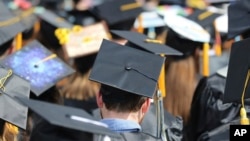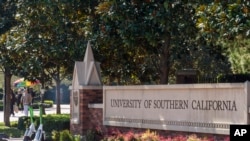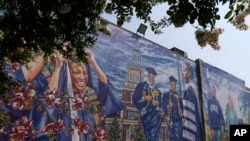Student Union
Top Posts of 2012 #3: The Cultural Nuances of Language
#3
The 'Wrong' Way to Answer 'How Are You?'
by Zita MF
It’s not a real question, she explained. "I’m expected to respond, 'Good' or 'Fine,' and ask the other person how they are, to which they will also respond, 'Good.'"
Read it: "The Wrong Way to Answer ‘How Are You?’"
"To this day, this style of greeting strikes me as an abuse of a question with which people show care and concern to one another in my culture," Zita wrote, but it says something important about American culture:In general, people from the U.S. do not like to express their emotions to strangers or acquaintances. They prefer to put on a permanent smile and mask their other feelings. The U.S. culture is based on individualism – the idea that one should only rely on one’s self and family – and this often leads them to avoid getting too close to others, including by using meaningful expressions in ways that might seem superficial to foreigners.
Zita decided, "[O]ne of the challenges and the beauties of living abroad is embracing the peculiarities of the host country. To me this means learning how to speak not only the language but also the culture."
Learning to speak both the language and the culture takes practice, and a willingness to make mistakes, a fact Anil was kind enough to share in one of our most brutally honest and funny posts of the year.
Read it: "Anil Explains Why You Should Never Be Embarrassed to Speak a Foreign Language"
When he first arrived in the U.S., Anil wrote, he kept to himself, worried that his English wasn’t good enough to communicate with others. But that all changed after a trip to the grocery store when he had to ask a staff person for help finding an item:
I couldn’t say anything. I couldn’t remember the word: raisin. I felt my face was burning, but I also knew I had to cope with the problem.
First I told her, “I want to buy some grapes which are not full with juice.” She threw me a gaze and said she couldn’t understand me. I tried another way. I said, “I am looking for the opposite of fresh grapes.” She was just shocked even more by what I had said and repeated, “I don’t understand.” I decided to take my last chance: “Do you have wrinkled, dried, ugly grapes?”
After the staff person stopped laughing, they got to talking and eventually became friends. "Just try to express yourself," Anil concluded. "It is the perfect way to improve yourself, and creating your own way brings laughter, new memories, and stories to share."
"Just express yourself" was one of many pieces of advice Sava gave in his in-depth look at techniques for improving English fluency, one of our most useful posts of 2012.
He also suggested listening as much as possible, including by eavesdropping on strangers’ conversations ("which is great until you get caught"), and using a mirror to watch yourself as you speak.
Read it: "Crafting Your Art of English Fluency"
"Watching yourself as you speak helps you visualize the way you’re moving your mouth. One thing I personally realized is that in English you have to hold your tongue a very particular way to pronounce certain words," Sava wrote."Watching and listening to myself as I practiced speaking also helped me notice that I project a better sound in English when I use a lower and deeper tone with my voice."
Still want more tips on improving your English? Shree wrote about his approaches, adopted while studying for the TOEFL exam earlier this year. He built English study into his normal routine, using things like talking to friends or listening to the radio as opportunities to practice his language skills.
Read it: "Why the TOEFL is More Important Than Just One Test, and How That Can Help You Succeed"
As Zita noted, "One of the most challenging aspects of being an international student is that you not only have to master a foreign language, but also to recognize the meaning that hides behind the words." But reaching that point is "all about finding the approaches that work best for you," said Sava. "Like art, learning a language is something that different people experience in different ways."Other top posts of 2012:
#5: Navigating and Defeating Negative Stereotypes
#4: The Surprising Links Between Food and Identity
#2: Keeping Standardized Tests in Perspective
#1: Taking Responsibility is the Key to Academic Success
See all News Updates of the Day
Malaysian official: Schools can’t turn away from global tensions

Zambry Abdul Kadir, Malaysia’s higher education minister, said protests spreading across universities in the United States show that schools can’t ignore political tensions.
Helen Packer, reporting in Times Higher Education, said the minister reminded educators that universities are key in the development of leaders, individuals and societies. (April 2024)
Social media breaks are difficult, but necessary

Between online classes, maintaining social connections and working on projects, college students can have a hard time disengaging from the demands of technology.
In Florida International University’s PantherNOW, Ariana Rodriguez offers strategies for taking a break from social media. (April 2024)
- By Melos Ambaye
Many master's degrees aren't worth the investment, research shows

Nearly half of master's degrees have a negative financial return, according to new research by the Foundation for Research on Equal Opportunity, an economic research organization.
The study indicates that many graduate degree programs do not increase lifetime earnings enough to be worth it.
While 23% of bachelor’s degree programs yield a negative financial return on investment, 43% of two-year degrees and master’s degrees fail to deliver a return, according to the study by Preston Cooper, a senior fellow at FREOPP.
Cooper assessed the return on investment for 53,000 degree and certificate programs to determine whether a student’s lifetime earnings outweigh program costs and the risk of not completing their degree.
His findings show that a student’s field of study was the overriding indicator of return on investment at the undergraduate and graduate level.
Engineering, computer science and nursing bachelor’s degrees have high financial returns on investment, while programs in education, fine arts, psychology and English usually have low returns.
Graduate degrees in medicine and law tend to have strong payoffs. But a large share of master’s programs, including the MBA, frequently have low payoffs, according to Cooper.
Although workers with master’s degrees earn 16% more than those with only bachelor’s degrees, Cooper says the figure fails to account for students who had “higher preexisting earnings potential.”
“MBA students typically have high preexisting earnings potential, having often chosen high-ROI undergraduate majors such as finance and economics,” Cooper writes. “So the MBA adds little value on top of that.”
The study indicates that high starting salaries are predictors of high returns on investment. Degrees with starting salaries of $57,000 a year or more deliver the best lifetime returns.
But the return on investment of a degree can vary depending on the educational institution.
“Students interested in fields with low average pay can still find some schools that do well transforming those fields of study into high-paying careers,” Cooper writes.
The quality of an institution also matters, said William Tierney, professor emeritus of higher education at the University of Southern California.
“An MBA from Harvard is a likely ticket to a good job,” Tierney told VOA. “An MBA from the University of Phoenix, less so.”
But students pursue graduate programs for more than just financial reasons.
“Some degrees open up careers in fields that students may enjoy, such as in the performing arts,” Robert Kelchen, head of educational leadership at the University of Tennessee, Knoxville, told VOA.
“Others can help gain access to social networks or simply help students learn about a topic that is of interest,” Kelchen added.
Cooper told VOA that it might make sense for students in degree programs with low returns on investment to switch majors if they can still graduate on time.
He found the worst outcome for a student’s return on investment is dropping out of college “because they must pay for one or more years’ tuition and spend time out of the labor force.”
Lawmakers who fund higher education have a responsibility in ensuring “higher education delivers on its promise of economic mobility,” Cooper said.
Nearly a third of federal funding, including Pell grants and student loans, pays for higher education programs that fail to provide students with a return on investment, according to the study.
Cooper’s view is that “some schools should shut down low-ROI programs and reallocate institutional resources to programs with a better return.”
“There's definitely this narrative out there that higher education is always worth it, and you should always try to get that extra degree because it will increase your earnings,” he told VOA. “That's reinforced by colleges who make lofty promises regarding their graduate degree programs' outcomes, which all too often fall short.”
Harvard students end protest as school agrees to discuss Gaza conflict

Protesters against the war between Israel and Hamas were voluntarily taking down their tents in Harvard Yard on Tuesday after university officials agreed to discuss their questions about the endowment, bringing a peaceful end to the kinds of demonstrations that were broken up by police on other campuses.
The student protest group Harvard Out of Occupied Palestine said in a statement that the encampment "outlasted its utility with respect to our demands." Meanwhile, Harvard University interim President Alan Garber agreed to pursue a meeting between protesters and university officials regarding the students' questions.
Students at many college campuses this spring set up similar encampments, calling for their schools to cut ties with Israel and businesses that support it.
The Israel-Hamas war began when Hamas and other militants stormed into southern Israel on October 7, killing some 1,200 people and taking 250 hostages. Palestinian militants still hold about 100 captives, and Israel's military has killed more than 35,000 people in Gaza, according to Gaza's Health Ministry, which doesn't distinguish between civilians and combatants.
Harvard said its president and the dean of the Faculty of Arts and Sciences, Hopi Hoekstra, will meet with the protesters to discuss the conflict in the Middle East.
The protesters said they worked out an agreement to meet with university officials, including the Harvard Management Company, which oversees the world's largest academic endowment, valued at about $50 billion.
The protesters' statement said the students will set an agenda that includes discussions on disclosure, divestment, reinvestment and the creation of a Center for Palestine Studies. The students also said that Harvard has offered to retract suspensions of more than 20 students and student workers and back down on disciplinary measures faced by 60 more.
"Since its establishment three weeks ago, the encampment has both broadened and deepened Palestine solidarity organizing on campus," a spokesperson for the protesters said. "It has moved the needle on disclosure and divestment at Harvard."
Chinese students report interrogations, deportations at US airports

Academics from China are reporting increased scrutiny at U.S. airports, with valid visa holders being interrogated and turned away by Customs and Border Protection Agents.
Phones and laptops have been searched, and researchers have undergone extensive questioning about their work. One graduate student at Yale, who was midway through her PhD, was turned back at Dulles airport and banned from entering the U.S. for five years, according to The Guardian.











